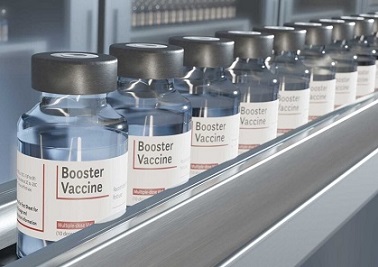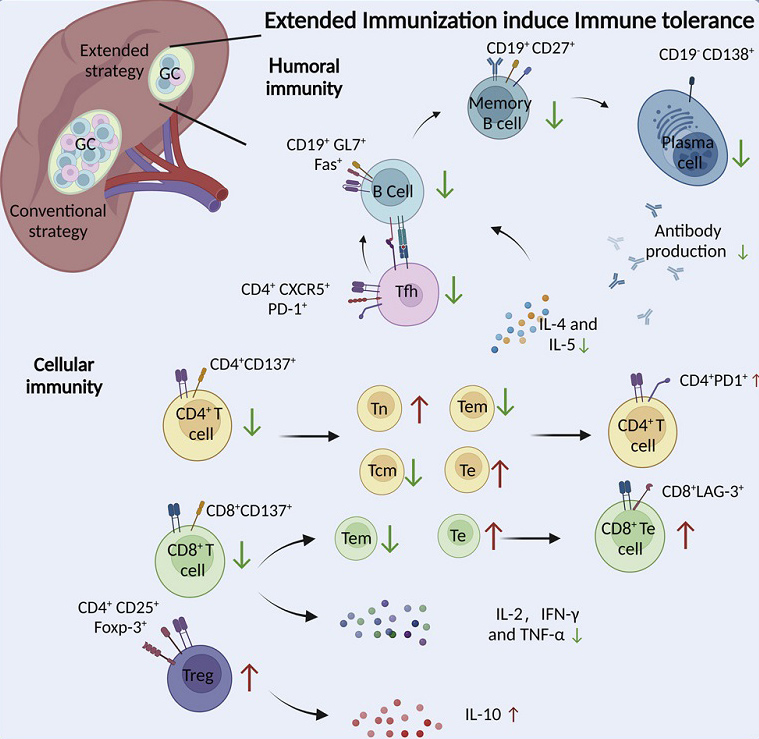COVID-19 News: Study Published In Peer Reviewed Journal Shows That Repetitive Boosters Cause Humoral And Cellular Immune Tolerance In Mice!
COVID-19 News - Repetitive Boosters Causes Immune Tolerance Jan 20, 2023 3 years, 1 week, 1 day, 14 hours, 33 minutes ago
COVID-19 News: A new study by researchers from Chongqing Medical University-China and the First Affiliated Hospital of Chongqing Medical University- China has found that repetitive COVID-19 booster shots cause humoral and cellular immune tolerance in mice!

The repetitive applications of vaccine boosters have been brought up in face of continuous emergence of SARS-CoV-2 variants with neutralization escape mutations, but their protective efficacy and potential adverse effects remain largely unknown.
The study team compared the humoral and cellular immune responses of an extended course of recombinant receptor binding domain (RBD) vaccine boosters with those from conventional immunization strategy in a Balb/c mice model.
The study findings showed that multiple vaccine boosters after the conventional vaccination course significantly decreased RBD-specific antibody titers and serum neutralizing efficacy against the Delta and Omicron variants, and profoundly impaired CD4+ and CD8+T cell activation and increased PD-1 and LAG-3 expressions in these T cells.
The study findings mechanistically confirmed that extended vaccination with RBD boosters overturned the protective immune memories by promoting adaptive immune tolerance.
The study findings demonstrate potential risks with the continuous use of SARS-CoV-2 vaccine boosters, providing immediate implications for the global COVID-19 vaccination enhancement strategies.
The study findings were published in the peer reviewed journal: iScience.
https://www.sciencedirect.com/science/article/pii/S2589004222017515
The key findings of the study were:
-repetitive immunizations impaired the serum neutralization activity
-repetitive immunizations suppressed the formation of germinal center
-repetitive Extended immunization inhibited the activation of CD4+T cell immune responses
-repetitive immunizations inhibited the activation of CD8+T cells
Thailand Medical News has also recently covered in our various
COVID-19 News coverages that the booster shots or bivalent shots are also not effective against many of the new emerging SARS-CoV-2 subvariants and sub-lineages in soem cases due to immunity imprinting!
https://www.thailandmedical.news/news/covid-19-news-stupids-saying-that-china-variants-have-been-circulating-before-bf-7-14,-ba-5-2-48,-ba-5-2-49-are-new,-past-exposure-to-ba-5-will-not-he
The study is the first to compared the effects of repeated RBD vaccine boosters with a conventional immunization course to those with an extended vaccination strategy, in a Balb/c mice model.
The study findings showed that the protective effects from the humoral immunity and cellular immunity est
ablished by the conventional immunization were both profoundly impaired during the extended vaccination course. Specifically, extended vaccination not only fully impaired the amount and the neutralizing efficacy of serum RBD-specific antibodies, but also shortened the long-term humoral memory. This is associated with immune tolerance in germinal center response, along with decreased numbers of spleen germinal center B and Tfh cells.
The study findings also demonstrated that extended immunization reduced the functional responses of CD4+ and CD8+T cells, restrained the population of memory T cells, and up-regulated the expression of PD-1 and LAG-3 in Te sub-type cells. An increased percentile of Treg cells was also observed, accompanied by significant elevation of IL-10 production.
The study findings provided crucial evidence that repetitive administration of RBD booster vaccines may negatively impact the immune response established by a conventional vaccination course and promote adaptive immune tolerance.
In the attempt to explain the mechanism of humoral immune tolerance associated with the extended immunization course, the study team analyzed the mechanisms involved in RBD-specific antibody production.
It was found that prolonged booster vaccination to mice caused a significantly reduced number of elementary factors and assistant T cells that would be required for B cell maturation and activation, relative to the conventional course of immunization.
Insufficient availability of Tfh cells might hinder the conventional process of B cell functional differentiation, and the decreased amount of serum IL-4 might impede B cell activation. These assumptions were supported by the fact that a significantly lower number of active B cells was detected within the germinal center from mice of the extended immunization group as comparing to the animals received conventional course of vaccination.
The study team notably found that the proportion of memory B cell was markedly reduced in the extended immunization group, together with signs of B cell immune tolerance, indicating the repetitive vaccination of booster shots shared similar mechanisms as seen from humoral immune tolerance of repeated antigen exposure, as during chronic viral infections.
Also, in addition to the humoral immune responses, cellular immune tolerance was observed during the extended course of RBD booster vaccination. Limited levels of antigen-specific memory T cell activation and profoundly decreased IL-2 and IFN-γ secretion were found in the sera of the extended group, contrast to sustained cellular immune responses after 4 doses of RBD vaccines.
 Graphical Abstract
Graphical Abstract
Also, it was reported that the chronic infection with HBV virus could result in antigen-specific cellular immune tolerance, which was manifested as a partial or complete inability to induce active immune response from antigen-specific CD8+T cells and significant increase in the surface expressions of inhibitory receptors, including PD-1, Tim-3 and CTLA-4.
Similarly, the study team found that prolonged administration of RBD booster vaccines overtly increased the levels of PD-1 and LAG-3, accompanied by significant reduction of the memory CD8+T cells.
https://onlinelibrary.wiley.com/doi/full/10.1111/jgh.12034
According to the study team, this is of particular importance, because memory CD8+T cell response is shown to play a predominant role for effective response against newly emerged SARS-CoV-2 variants, which greatly challenged humoral immunity with collective neutralization escape mutations.
Hence, over-stimulation with the same booster vaccine or reinfection after vaccination may severely hamper the cellular immune response established by conventional vaccine course, which, together with challenged humoral immune responses, may lead to prolonged disease duration and/or aggravation of symptoms in recipients.
Furthermore, over-vaccination may generate an immunosuppression micro-environment that is also an important facilitator of immune tolerance.
The study findings demonstrated that both the percentage of CD25+Foxp3+CD4+ Treg cells and the levels of immunosuppression cytokines IL-10 were up-regulated after extended RBD vaccine booster vaccination.
This may result in reduced activation and differentiation of B cells on antigen stimulation, as well as functional inhibition of antigen-presenting cells (APCs) and consequential decrease in CD8+T cell activation.
The study team did indeed observe both humoral and cellular immune tolerance with the doses of extended booster administrations, which made it safe to speculate that over-vaccination might severely impact the immune protective efficacy established by conventional SARS-CoV-2 immunization, and probably enhance disease severity for new COVID-19 patients or re-infectants.
Though RBD subunit vaccines cannot entirely represent inactivated or mRNA vaccines, especially in antigen delivery way. A recent report in The New England Journal of Medicine demonstrated that a fourth mRNA vaccination of healthy young health care workers only shows marginal benefits.
https://www.nejm.org/doi/full/10.1056/NEJMc2202542
As to whether extended vaccination with other COVID-19 vaccines based on wild-type SARS-CoV-2 sequence will induce immune tolerance, further investigations are required.
The research team concluded that the study findings shows that repeated dosing after the establishment of vaccine response might not further improve the antigen-specific reactivity; instead, it could cause systematic tolerance and inability to generate effective humoral and cellular immune responses to current SARS-CoV-2 variants. The study findings provide timely information for the prevention of COVID-19. It puts an extended immunization course with two or more RBD-based vaccine boosters at debate, and warns for the future applications of vaccine enhancers without proper evaluation of serum antibody titers and T cell functions.
For the latest
COVID-19 News, keep on logging to Thailand Medical News.

